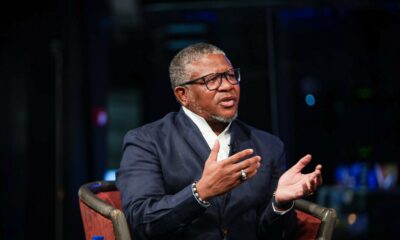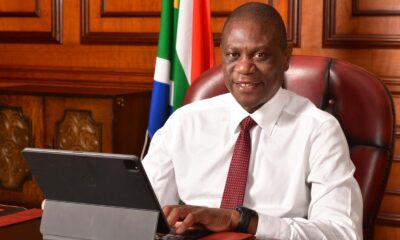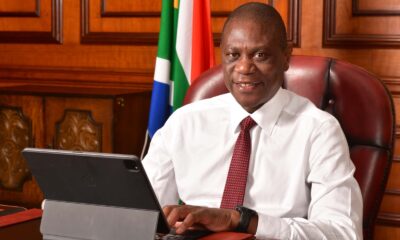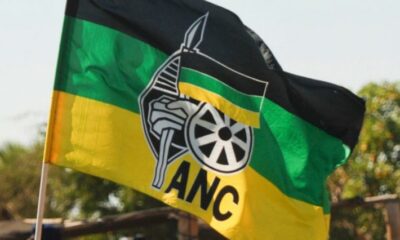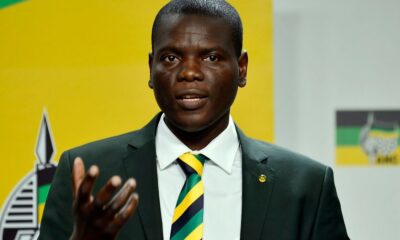News
Lotto, Power and Patronage: The Political Shadows Behind South Africa’s Billion-Rand Jackpot

The new face of South Africa’s national lottery has sparked a fresh public outcry, and this time, the jackpot might be political proximity.
A licence to print billions but at what cost?
The national lottery is one of South Africa’s biggest cash cows, with last year’s operator, Ithuba Holdings, raking in over R7.2 billion in turnover. When the Department of Trade, Industry and Competition announced the new winner of the lucrative eight-year licence in May a little-known consortium called Sizekhaya Holdings — most South Africans didn’t blink.
That changed quickly.
Whispers of political connections soon turned into a spotlight when it emerged that Deputy President Paul Mashatile’s sister-in-law is a shareholder through Bellamont Gaming, a company co-founded with KwaZulu-Natal businessman Moses Tembe, who also happens to chair Sizekhaya.
The links go deeper
Khumo Bogatsu, Bellamont’s co-director, is the twin sister of Mashatile’s wife, Humile. The deputy president married Humile in a lavish celebration in 2023, with South Africa’s political and corporate elite in full attendance. Just months later, Bellamont Gaming was registered, with Bogatsu and Tembe at the helm.
Bellamont then joined hands with other partners to form Sizekhaya Holdings just days before the February 2024 deadline to bid for the lottery licence. The timing, and the players involved, have raised uncomfortable questions.
Tembe’s influence doesn’t end there. From his palatial mansion on Bellamont Road near Umdloti Beach — which inspired the name of his cluster of companies to his close public appearances with Mashatile, the two appear more than casual acquaintances. The deputy president has reportedly stayed at Tembe’s home, including during the ANC’s election manifesto launch in Durban last year.
A trip to France, a photo op, and more questions
In May, Tembe and another Sizekhaya-linked businessman, Sandile Zungu, were seen alongside Mashatile at an investment conference in France. Photos show the deputy president dining with both men, raising further concern about blurred lines between politics and private interests.
Zungu, who once eyed the ANC’s KwaZulu-Natal leadership, also represented his company, Zungu Investments, at the same event. Both men were reportedly invited by the South African ambassador to France — but critics wonder whether these invitations were part of a broader pattern of elite networking tied to state-linked deals.
Official response: Deny, deny, deny
The Presidency, Sizekhaya, and everyone in between have rejected claims of undue influence. Mashatile’s spokesperson insisted the deputy president had no role in the lottery bid process and that his familial ties to one of the shareholders were irrelevant.
Sizekhaya, for its part, has gone on the offensive. It labelled the controversy “defamatory” and stressed that it followed every legal requirement, including the Lotteries Act, which prohibits any political party or office-bearer from having a direct financial interest in a lottery licence.
According to Sizekhaya, Bellamont is a “minority shareholder”, and neither Mashatile nor his wife benefit directly or indirectly. Bogatsu, they note, is not a political office-bearer and is free to pursue her business interests.
Still, the specifics of who owns how much and who stands to benefit, remain opaque.
The R180-billion elephant in the room
Build One South Africa (BOSA) and the EFF have been among the loudest voices raising red flags. BOSA even filed a PAIA application to access the list of adjudicators in the licence process. “At R180-billion, this is the country’s biggest tender,” BOSA deputy leader Nobuntu Hlazo-Webster said. “The public deserves transparency.”
The EFF went further, accusing Minister Parks Tau of evading direct questions and fueling public distrust.
Past shadows and political history
This is not the first time South Africa’s lottery has drawn scrutiny. The award process has long been mired in allegations of favoritism, court challenges, and secrecy. This fourth licence bid was delayed multiple times before Tau finally made his announcement, calling it an “arduous” evaluation.
He cited the need to vet owners and managers to ensure none were politically conflicted. But in a country where business and politics are notoriously intertwined, such reassurances are wearing thin.
Public reaction: Smoke, fire, and fatigue
Social media users have been anything but silent. On X (formerly Twitter), the hashtag #LottoGate began trending after the story broke, with users accusing the ANC of “eating everything”, while others drew parallels to past scandals involving state capture and cadre deployment.
“Only in SA can the lottery look like a family reunion,” one user quipped.
The bigger issue: trust
At its heart, this controversy isn’t just about a licence, it’s about public trust. South Africans are tired. From Eskom to Transnet, they’ve seen how political interference can cripple public institutions. The lottery was supposed to be different, a transparent system that funds schools, charities, and sports, not a side hustle for the politically connected.
Until the full details of ownership are made public and the role of high-level relationships are properly scrutinised — the perception of patronage will continue to hang over this deal.
Will anything change?
If recent history is anything to go by, probably not. But one thing is clear: South Africans are watching — and they’re not buying the spin. Whether through court challenges, public pressure, or investigative journalism, the truth has a way of surfacing.
And when it comes to this particular jackpot, the stakes are higher than ever.
{Source: Daily Maverick}
Follow Joburg ETC on Facebook, Twitter , TikTok and Instagram
For more News in Johannesburg, visit joburgetc.com

